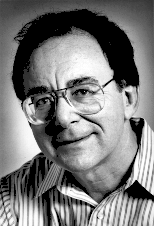 Richard Karp
Richard Karp
 Richard Karp
Richard Karp Karp was among the first to recognize the importance of Stephen Cook's concept of NP-completeness. Building on Cook's work, in a very influential and groundbreaking 1972 paper, Karp showed the NP-completeness of 21 fundamental problems whose computational complexity had been open for years, including the problems CLIQUE, VERTEX COVER, HAMILTONIAN CYCLE (both directed and undirected verisons), 3-DIMENSIONAL MATCHING, KNAPSACK, and PARTITION.
Since then, Karp has made many fundamental contributions to theoretical computer science, including work on fast parallel algorithms, string matching, and, most recently, computational biology.
Karp has won many awards for his research, including the Fulkerson Prize in Discrete Mathematics, 1979; the Lanchester Prize in Operations Research, 1977; the ACM Turing Award in 1985; and the US National Medal of Science, 1996.